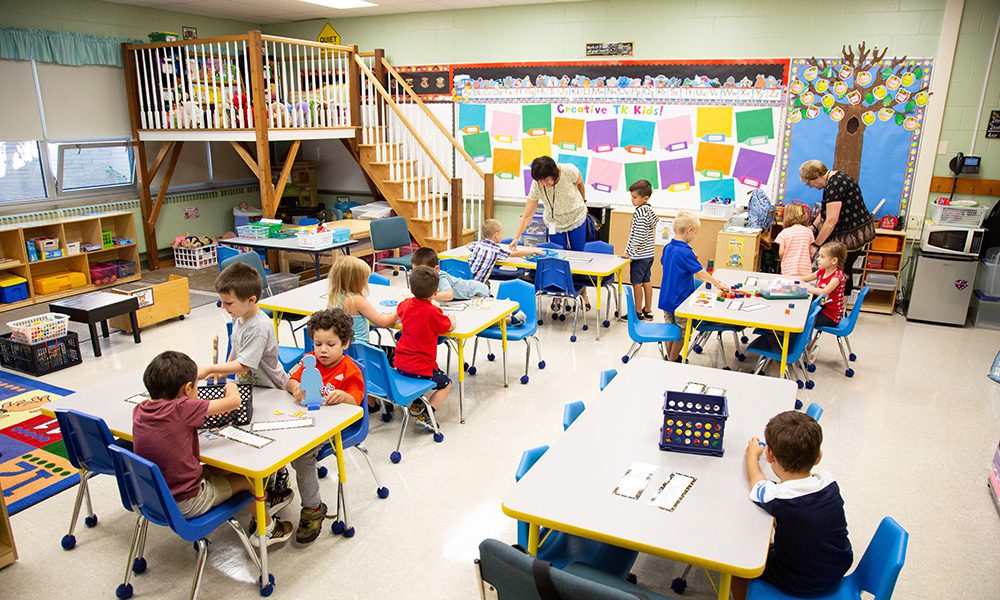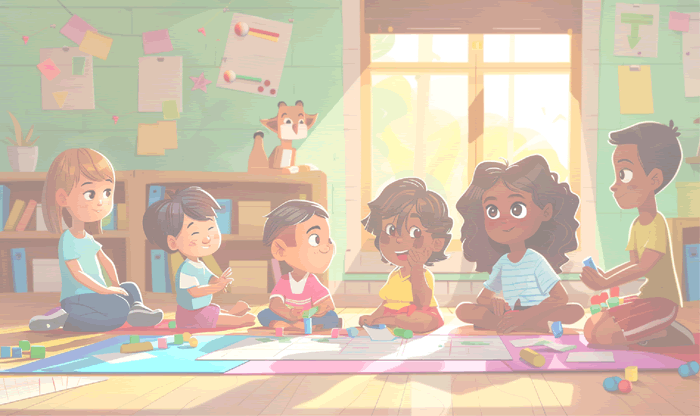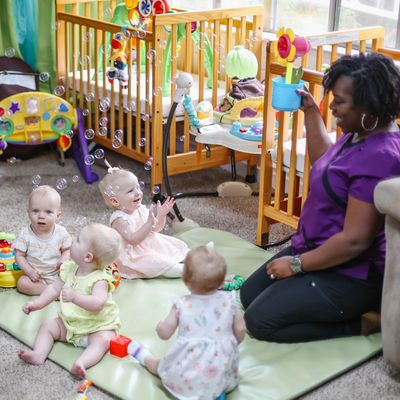Modern technology that enhances student learning at Private Grade School Peoria
Wiki Article
The Significance of Interactive Activities in Grade School Education And Learning
Interactive tasks play an important duty in elementary school education. They engage students and boost discovering outcomes. With team projects and hands-on experiments, pupils experience the material in a practical method. This approach deals with diverse learning designs and advertises vital skills. However, the advantages prolong past academics. Exploring the deeper effect of these tasks exposes their importance in shaping young learners' futures. What makeovers happen when trainees actively participate?Enhancing Involvement Through Interactive Knowing
Typical training methods have their advantages, interactive learning substantially boosts trainee engagement in quality school education and learning. This approach urges energetic engagement, allowing students to submerse themselves in the understanding procedure. By utilizing team tasks, hands-on experiments, and technology-driven resources, teachers create an environment where pupils feel much more attached to the material.Interactive understanding facilitates partnership among peers, cultivating communication abilities and synergy. It also accommodates varied discovering designs, ensuring that visual, auditory, and kinesthetic learners can all thrive. Additionally, pupils are a lot more likely to maintain details when they proactively participate, as opposed to passively obtaining understanding.
This dynamic method not just makes discovering pleasurable yet also imparts a feeling of ownership in students concerning their educational journey. As they involve with the web content, their interest and motivation to find out rise, laying a solid foundation for future academic success.
Establishing Important Believing Abilities
Interactive knowing not only improves interaction but also acts as a catalyst for establishing vital thinking abilities in quality institution trainees. Via activities such as problem-based understanding, debates, and hands-on experiments, students are motivated to examine info, assess various point of views, and develop reasoned verdicts. These interactive experiences call for students to wonder about presumptions, leading them to think more deeply regarding numerous subjects.
Interactive activities typically existing real-world situations that test trainees to use their expertise creatively. By maneuvering via these challenges, they find out to determine appropriate details and make informed choices. This procedure cultivates not just specific important reasoning but additionally motivates students to verbalize their assumed procedures, boosting their ability to communicate successfully. Therefore, interactive understanding settings cultivate a generation of essential thinkers who are better prepared to deal with complex issues in their future scholastic and expert ventures.
Cultivating Cooperation Amongst Peers
Cultivating cooperation among peers is crucial in elementary school education, as it enhances teamwork and interaction abilities. Participating in group activities assists pupils build trust fund and respect for each other, preparing for reliable partnership. Furthermore, analytical with each other enables pupils to pick up from each other and develop a cumulative strategy to challenges.Synergy and Interaction Abilities
Effective synergy and communication skills are important elements of a successful elementary school education and learning. Taking part in interactive tasks encourages trainees to work together, share ideas, and fix troubles with each other. Such experiences promote the development of important communication capacities, enabling kids to share their ideas plainly and pay attention actively to others. With team effort, trainees find out to value varied viewpoints, fostering a feeling of area and shared obligation. Structured group tasks, whether in academics or imaginative jobs, enhance peer communications, showing kids exactly how to work out functions and fix disputes. Consequently, these abilities not just add to a positive classroom environment but likewise prepare trainees for future collective ventures in higher education and the work environment. Generally, team effort and communication are fundamental to holistic development in elementary school.Structure Trust Fund and Respect
Structure depend on and respect among peers functions as a keystone for successful collaboration in elementary school environments. When trainees really feel valued and respected by their classmates, they are extra most likely to involve proactively in team tasks. Interactive tasks, such as group jobs and cooperative games, provide opportunities for trainees to gain from each other, promoting a feeling of area. This setting encourages open communication, allowing pupils to share their ideas and point of views without concern of judgment. As depend on constructs, trainees end up being more prepared to share responsibilities and support each various other's learning. Eventually, growing an ambience of depend on and respect improves not only academic outcomes yet likewise social growth, outfitting pupils with necessary interpersonal abilities for their future ventures.Problem-Solving With each other
Collective analytical involves students in vital reasoning and synergy, important skills for their personal and academic development. When trainees collaborate to tackle difficulties, they learn to connect properly, respect varied perspectives, and take advantage of each various other's strengths. This process boosts their capability to assess troubles from different angles and develop innovative solutions. Group tasks, such as scientific research experiments or mathematics challenges, promote energetic participation and cultivate a sense of area. As pupils collaborate, they likewise build social abilities, finding out to compromise and work out, which are crucial for future interactions. Inevitably, analytic with each other grows an encouraging knowing setting, empowering students to take ownership of their education and learning while preparing them for collaborative undertakings beyond the class.Encouraging Creativity and Advancement
Encouraging creativity and development in quality institution education and learning can be greatly boosted with hands-on discovering experiences. These tasks allow students to engage directly with materials and principles, promoting imaginative thinking. In addition, collective group jobs can promote varied ideas and remedies, even more supporting a creative atmosphere.Hands-On Learning Knowledge
A wide variety of hands-on knowing experiences greatly enhances imagination and innovation in grade institution education and learning. Engaging pupils in functional activities allows them to apply theoretical expertise in real-world contexts, fostering deeper understanding. By adjusting tools and products, children create crucial problem-solving skills and find out to think outside the box. These experiences inspire interest and inspire students to discover their passions better. Additionally, hands-on tasks can link different topics, linking science, art, and math in meaningful means. This interdisciplinary method urges trainees to see links and think artistically. Inevitably, hands-on knowing experiences nurture a generation of trendsetters, equipping them with the skills and confidence required to deal with future obstacles and contribute to society in special ways.Collaborative Group Projects
Hands-on knowing experiences naturally bring about the unification of joint group jobs, which play a crucial role in cultivating creativity and development in elementary school education. These jobs encourage trainees to interact, sharing concepts and perspectives, which enhances analytical skills and crucial reasoning. Through partnership, students find out to connect successfully and respect diverse perspectives, important abilities for their future. In addition, group projects offer chances for click this trainees to try out different duties, enhancing their versatility and self-confidence. Participating in this participating environment allows them to explore their imagination, pushing the boundaries of standard learning. Inevitably, joint group tasks not only enrich the educational experience but likewise prepare students for real-world obstacles that call for team effort and ingenious reasoning.Building Self-confidence and Independence
As trainees engage in interactive activities, they commonly discover possibilities to build confidence and independence. These activities, whether they include hands-on jobs, role-playing, or analytical tasks, encourage trainees to take initiative and reveal their concepts freely. By taking part in such experiences, students discover to trust their capacities and make choices without counting entirely on advice from teachers or peers.Interactive tasks cultivate a feeling of possession over discovering. When pupils take on challenges collaboratively or separately, they develop essential assuming abilities and durability. This procedure not just enhances their understanding of the topic however also empowers them to take threats in their understanding trip.
As they navigate numerous interactive circumstances, pupils progressively shed their self-doubt, leading the way for enhanced self-esteem - more info here Private School. Eventually, these activities play an essential duty in supporting confident and independent learners, equipped to encounter future scholastic and personal difficulties
Producing a Favorable Class Environment
While promoting a positive class atmosphere is vital for reliable discovering, it needs willful initiative from teachers to create a room where trainees feel safe, reputable, and involved. A favorable atmosphere encourages collaboration, permitting trainees to reveal themselves without worry of judgment.Educators can achieve this by developing clear assumptions, advertising shared regard, and recognizing specific contributions. Integrating interactive activities additionally improves involvement, making learning more enjoyable and dynamic.
Furthermore, a nurturing atmosphere sustains social-emotional growth, as students discover to browse partnerships and deal with conflicts. Teachers play an essential function in modeling positive behavior and reinforcing a society of compassion and inclusivity.
Regularly Asked Questions

Exactly How Can Moms And Dads Assistance Interactive Learning in the house?
Parents can support interactive understanding in your home by giving interesting products, encouraging hands-on projects, integrating academic video games, fostering discussions, and creating a nurturing atmosphere that advertises curiosity and exploration in their children's finding out experiences. (Private School)What Kinds Of Interactive Tasks Are The Majority Of Reliable?
Hands-on tasks, joint games, role-playing scenarios, and academic modern technology applications are amongst one of the most effective interactive tasks. These engage pupils, enhance vital thinking skills, and advertise team effort, ultimately fostering a much deeper understanding of numerous subjects.Exactly How Do Interactive Tasks Deal With Various Understanding Styles?
Interactive activities engage visual, acoustic, and kinesthetic learners by integrating varied approaches. These activities assist in understanding through hands-on experiences, joint discussions, and visual aids, allowing pupils to absorb information according to their favored understanding style.What Are the Prices Associated With Implementing Interactive Tasks?

Carrying out web interactive tasks incurs prices such as products, training for instructors, modern technology upgrades, and possible center alterations. Budget restrictions can likewise impact the frequency and selection of tasks provided to students in educational setups.
Exactly How Can Educators Examine the Influence of Interactive Learning?
Educators can analyze the effect of interactive learning via monitorings, student comments, efficiency metrics, and comparative analysis of examination scores before and after execution, making certain a comprehensive understanding of engagement and knowledge retention enhancements.With tasks such as problem-based learning, disputes, and hands-on experiments, trainees are motivated to examine information, assess different point of views, and formulate reasoned final thoughts. Interactive activities commonly present real-world scenarios that test trainees to use their understanding creatively. Engaging in interactive activities encourages students to work together, share concepts, and address issues with each other. Interactive activities, such as group tasks and cooperative games, supply possibilities for trainees to learn from one another, fostering a sense of community. As trainees engage in interactive tasks, they typically uncover opportunities to construct self-confidence and independence.
Report this wiki page